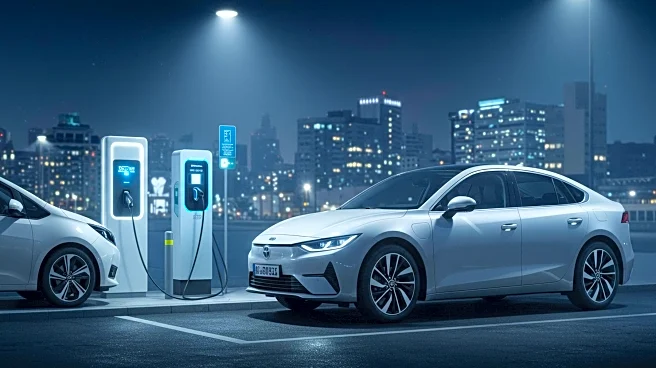What's Happening?
In the first half of 2025, South Africa saw a significant increase in plug-in hybrid electric vehicle (PHEV) sales, surpassing battery electric vehicle (BEV) sales for the first time. A total of 788 PHEVs were sold, compared to 570 BEVs. This growth is attributed to the introduction of new models from Chinese manufacturers such as Chery, Omoda, Jaecoo, and Haval, which offer PHEVs with longer electric ranges and competitive pricing. Chery's PHEVs accounted for 27% of all PHEV sales, while BMW led the market with a 48% share. Despite the increase in PHEV sales, BEV sales have stagnated, partly due to high import duties and taxes on electric vehicles, which are set at 25%, compared to 18% for petrol and diesel vehicles.
Why It's Important?
The shift in consumer preference towards PHEVs over BEVs in South Africa highlights the impact of economic factors such as import duties on vehicle adoption. The higher taxes on BEVs make them less attractive to consumers, despite their environmental benefits. This trend could influence government policy, as reducing import duties on BEVs might encourage their adoption and support the country's transition to cleaner energy vehicles. The success of PHEVs also reflects a growing market for vehicles with extended electric ranges, which cater to the commuting needs of South Africans, especially those with access to solar charging at home.
What's Next?
The South African government may consider revising import duties on BEVs to match those of internal combustion engine vehicles, following examples from other African countries that have reduced or eliminated such taxes. Additionally, the anticipated launch of more affordable BEVs, like the BYD Seagull, could further influence market dynamics. If priced competitively, these new models could boost BEV sales, provided the government adjusts its tax policies to make them more accessible to consumers.
Beyond the Headlines
The current trend in vehicle sales could have long-term implications for South Africa's automotive industry and environmental policies. The preference for PHEVs suggests a transitional phase where consumers are open to hybrid solutions but are deterred by the cost of full electric vehicles. This situation underscores the need for strategic policy interventions to promote sustainable transportation and reduce reliance on fossil fuels.









